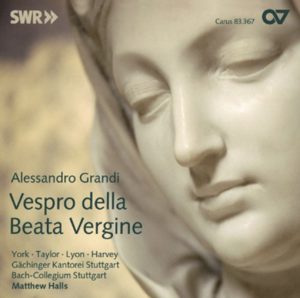Jonathan Slawson, Journaliste
Alessandro Grandi – Vespri Beata Vergine – Carus
Alessandro Grandi (1586-1630) était un compositeur parmi beaucoup d’autres de l’époque classique dont les travaux étaient sous-estimés et peu connus. Pourtant, à côté de celle de Monteverdi, sa musique représentait sans doute une force déterminante dans le développement de la première période de la musique baroque. Son exploration du style « concertato » a marqué le début de l’époque, et ses études de la cantate ont présagé la musique de J.S. Bach. Mais sa carrière entière était éclipsée par son mentor, Claudio Monteverdi, qui était plus célébré pour avoir initié ses auditeurs à la polyphonie et à la « basso continuo » (la basse continue). Il a été surnommé ainsi le pionnier de la musique baroque.
Ici, Carus a rassemblé sans heurt beaucoup de la musique de Grandi dans un office de vêpres puissant. Le CD a été enregistré en directe pendant le ‘Musikfest Stuttgart 2010’. Il met en vedette Grandi, comme il le mérite, en rendant hommage à sa musique en son largeur et en son profondeur.
Les musiciens Gächinger Kantorei Stuttgart sont merveilleux. Une liste impressionnante de solistes complète l’ensemble. Deborah York (soprano), Daniel Taylor (alto), Ed Lyon (ténor), et Peter Harvey (basse). L’équilibre de l’enregistrement favorise les vocalistes, ce qui correspond bien à l’utilisation par Grandi de l’instrumentation comme seul accompagnement pour les chanteurs. Mais il se peut que des auditeurs modernes puissent préférer le son plus équilibré entre l’instrumentation et les voix. La fusion entre les solistes et le chœur est aussi impressionnante. Peut-être, de temps en temps un petit peu moins de vibrato, ou même une résonance plus en avance pouvaient donner un son plus vif, surtout dans les sections chorales polyphoniques. Cependant, le chœur est complètement unifié et bien accordé.
Comme cette compilation des œuvres de Grandi représente une section transversale de styles musicaux divers, chaque auditeur aura ses propres préférés. Les miens sont Dixit Dominus (piste 3), O Quam Tu Pulchra Es (piste 10), et Ave Maris Stella (piste 12). Dixit Dominus démontre un son choral bien équilibré, uni, intercalé par des solos qui sont plein de mélismes pleins d’entrain et bien articulés. O Quam Tu Pulchra Es est simplement trop beau pour trouver des mots, et la nuance vocal de Lyon lui donne la qualité délicate qu’il mérite. Dixit Dominus est caractérisé par un appel et une réponse éblouissants entre le chant des hommes, l’orchestre et les solistes.
Vous devez avoir cet enregistrement pour la seule raison de mettre en lumière Alessandro Grandi. Vous aussi aurez vos préférés, et il se peut que vous souhaitiez les partager avec vos chœurs du monde entier.
Listen music samples here: http://goo.gl/dcppg
 Jonathan Slawson est diplômé en musicologie à l’ Université Chorale de Westminster et prépare actuellement un master de management des organisations à but non lucratif à l’Université de New School. Ses intérêts professionnels l’attirent vers des domaines aussi variés que l’éducation artistique, la politique et le management. Après avoir effectué un stage au sein de l’administration et des relations publiques du Lincoln Center, il travaille aujourd’hui en tant qu’assistant au développement au Bravo Lincoln Center Campaign, la structure chargée de récolter des fonds pour le redéveloppement du Lincoln Center. Il a écrit pour le magazine In Tune Monthly produit par Disney, pour lequel il était éditeur du guide des professeurs. Il a travaillé aux New World Stages (les Scènes du Nouveau Monde) et au Théâtre Mc Carter. Il a enseigné la musique à l’école primaire Maureen M. Welch, et aux Centres des Arts Vivants de New Jersey et de Stagestruck. Il est membre du bureau de la Blair Academy et a reçu en 2009 le prix du Président de l’Université Chorale de Westminster, la plus haute distinction de cette institution.
Jonathan Slawson est diplômé en musicologie à l’ Université Chorale de Westminster et prépare actuellement un master de management des organisations à but non lucratif à l’Université de New School. Ses intérêts professionnels l’attirent vers des domaines aussi variés que l’éducation artistique, la politique et le management. Après avoir effectué un stage au sein de l’administration et des relations publiques du Lincoln Center, il travaille aujourd’hui en tant qu’assistant au développement au Bravo Lincoln Center Campaign, la structure chargée de récolter des fonds pour le redéveloppement du Lincoln Center. Il a écrit pour le magazine In Tune Monthly produit par Disney, pour lequel il était éditeur du guide des professeurs. Il a travaillé aux New World Stages (les Scènes du Nouveau Monde) et au Théâtre Mc Carter. Il a enseigné la musique à l’école primaire Maureen M. Welch, et aux Centres des Arts Vivants de New Jersey et de Stagestruck. Il est membre du bureau de la Blair Academy et a reçu en 2009 le prix du Président de l’Université Chorale de Westminster, la plus haute distinction de cette institution.
Avez-vous un CD que vous souhaitez revoir sur les pages de ce bulletin ?
Merci de me contacter à l’adresse suivante : jonathan.ryan.slawson@gmail.com.
Traduit de l’anglais par Eugénie Ong (République Tchèque)



